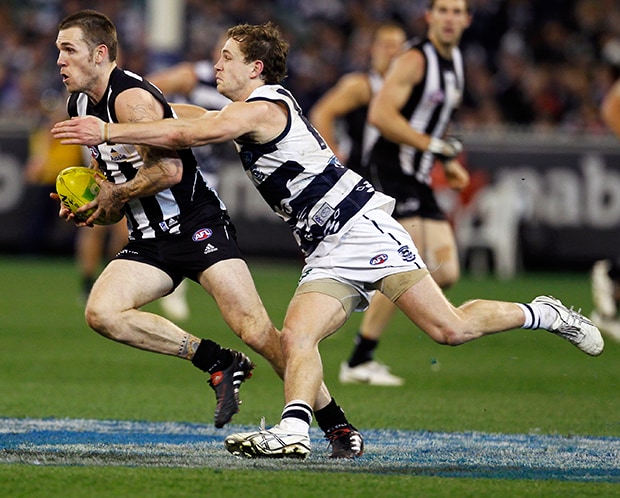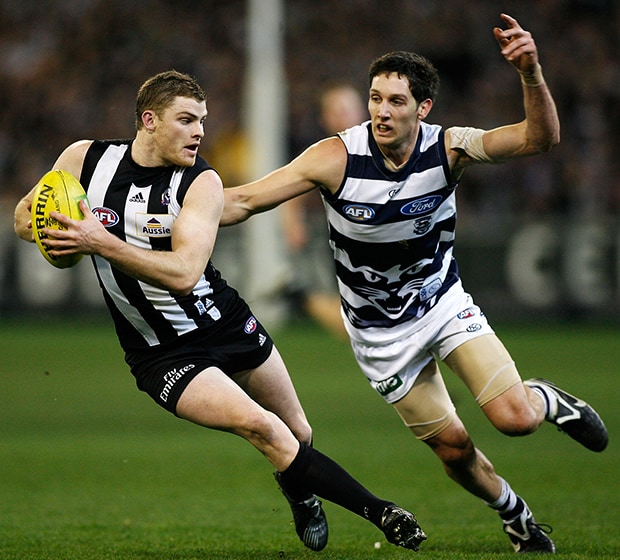Every match that Collingwood plays feels like it's the most important game in the world.
But the truth is that some games matter more than others. And some have impacts that last for decades, even if that significance isn't always apparent at the time.
So here is a trawl through the history books to come up with the most significant games in Magpie history. These aren't just the biggest wins or the most memorable days, but the games that had a significant influence on the club's history.
We've excluded all finals, simply because otherwise the list would almost be completely taken up with premierships and a few painful Grand Final losses. But the home-and-away games covered in this series have had a huge impact on the club – sometimes positively, sometimes negatively. They've led to club turmoil, coaches being sacked, major changes in the game or sometimes set us on the path to a flag.
Whatever the outcome, these games represent major turning points in our club's story. And they're worth recalling.
Attacking the Cats
It's easy to forget now, but Collingwood was a long way from being one of the premiership favourites when the 2010 season began.
St Kilda and Geelong had been clearly the best teams in 2009, dominating the home-and-away season and playing off in a nail-biting Grand Final. We finished fourth on the ladder – a massive 20 points behind the Saints – and fell to them by five goals in the first final. Geelong would smash us by more than 12 goals in the Preliminary Final two weeks later.
Clearly, it was these two teams we needed to beat if we were to prove that we were contenders, and not just pretenders, in 2010. We played each of them twice, and each game was its own little litmus test.
The first came in round three against St Kilda, a bizarre and at times controversial match at Etihad Stadium. We actually outplayed the Saints for much of the game, led by three points at half-time and would surely have got closer than the final margin of 28 points if not for a catastrophic night in front of goal, which ended with a goalless second half and a final score of 4.17.
It was a not dissimilar story six weeks later against Geelong. It wasn’t a bad performance, by any means, and there was only five points in it at half-time. But, as had happened against St Kilda, the Magpies fell away badly in the second half, managing only 2.12 and a final score of 6.14 to slide to a six-goal defeat.
Still, there were signs of hope. Many critics still felt we sat just a notch below the two leading teams. But Robert Walls, in The Age, thought both the Cats and Saints would be keeping an eye on us. "Why?" he asked.
"Because the Pies of 2010 are better than 2009, and are a genuine chance of winning the flag. There is a lot to like about this year's Magpies. They are younger, faster, harder and share the ball by hand more than they have in the past. What Mick Malthouse has been able to do is blend the new with the old to produce a hard-working, highly skilled team that doesn't rely on stars."

Dane Swan bursts away from Joel Selwood on his way to a 32-disposal performance.
So all eyes began to turn to the return encounters. And this was where our season changed.
First up came the Saints in round 16. Travis Cloke was suspended after an errant elbow against Port, and skipper Nick Maxwell missed with a calf injury. The Magpies were desperately searching for premiership credibility, and the inner belief that only comes from beating the best. They knew that this match, and the one to come against Geelong in a few weeks, would be crucial to their chances.
In front of more than 81,000 fans, the Pies started the game on fire, throwing themselves at the footy and the contest, and the Saints were unable to withstand the early pressure. ‘The press’ was operating at extreme levels, Luke Ball and Heath Shaw setting the tone with fierce tackles inside their forward 50 that led to team-lifting goals. Leigh Brown nailed one from the boundary, Chris Dawes marked and goaled, and by quarter-time the Pies had a three-goal break.
That margin grew to 26 by the long break, and the Pies then put the game to bed in the third term with four straight goals. The Magpies continued to apply the squeeze and the Saints simply had no answers. Four more goals in the final term ended up securing an eight-goal win, leaving the Pies on top of the ladder after round 16 for the first time since 1990.
Some media outlets installed the Pies as premiership favourites after that win. But even the most optimistic Magpie fans knew such favouritism couldn’t be justified until their team had beaten the mighty Geelong. So the Round 19 contest between the two became an even bigger blockbuster than Collingwood and the Saints had been.
The Pies had warmed up perfectly, first with an 82-point rout of Richmond (during which Didak unveiled his now famous ‘shimmy’), then with a nine-goal-to-two first half that destroyed Carlton. They were ready for their biggest test of the season.
To say they passed that test with flying colours is a massive understatement. The Pies dominated the first quarter-and-a-half, so much so that the ball rarely made it out of their forward 50. ‘The press’ was on in full force, the tackling was ferocious (Luke Ball alone had 14 for the game) and the attacking pressure relentless. Wellingham, Pendlebury, Thomas, Swan and Didak were unstoppable, but there were no passengers. The team has rarely played better. Geelong couldn’t find a way out, or around, or through, and only Collingwood’s lack of clinical finishing – again – kept the margin to 28 points midway through the second quarter.
But Geelong then showed its class, briefly taking control of the contested possessions and changing the game completely. By midway through the third term they led by 12 points. But the Pies fought back again, kicking the last four goals of the term to lead by 13 at the last change.
Good luck catching Heath Shaw when in full flight.
The final result showed a 22-point victory to Collingwood, though the margin flattered Geelong. But just as important as the outcome was the way the game had been played, with the Cats being thrashed in contested possessions (144 to 102), clearances (48-26) and inside-50s (66 to 37). Even yet another bout of wayward kicking (14.23, including five posters) couldn’t disguise Collingwood’s superiority. With the exception of about 25 minutes in the second and third quarters, the reigning premiers had been completely outplayed.
Rohan Connolly wrote in The Age afterwards: "Collingwood proved once and for all it can beat every team in the competition. The Pies are alive, the energy and fervour with which they play palpable, the defensive pressure manic, and the hunger to cash in on it insatiable. After Saturday night, there's no question now – Collingwood can take on anyone."
The win installed Collingwood as clear flag favourites. But more importantly it gave the players – and the club as a whole – a firm belief, not just hope, that they could go all the way.
And that, in the end, is exactly how it played out.
Turning Points
Written by Glenn McFarlane and Michael Roberts
Turning Points: A game of belief.
Turning Points: The first game.
Turning Points: History's ugly repeat.
Turning Points: Honouring the greater good.
Turning Points: A turning point for football.
Turning Points: How we landed McHale.
Turning Points: Ending the Cat empire.
Turning Points: The practice match that led to a revolution.
Turning Points: Starting from the bottom.
Attacking the Cats
It's easy to forget now, but Collingwood was a long way from being one of the premiership favourites when the 2010 season began. But by the 19th round, the Pies had cemented themselves as contenders.


